

The%20Library%20and%20Information%20Sector%20Core%20Knowledge%20Skills%20and%20Attributes%20December2014%20%282%29. Guidelines for legal deposit legislation en. Collecting Plan - Rare Books and Fine Printing Collection: 2016-2018. Contact Person: Anthony Tedeschi, Curator, Rare Books and Fine Printing, Alexander Turnbull Library, National Library of New ZealandEmail: anthony.tedeschi@dia.govt.nzPhone: +64 4 474 3023 Purpose The Rare Books and Fine Printing Collection is a national collection, built on the collecting interests of Alexander H.
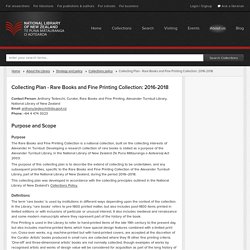
Turnbull. Developing a research collection of rare books is stated as a purpose of the Alexander Turnbull Library, in the National Library of New Zealand (Te Puna Mātauranga o Aotearoa) Act 2003. The purpose of this collecting plan is to describe the extend of collecting to be undertaken, and any subsequent priorities, specific to the Rare Books and Fine Printing Collection of the Alexander Turnbull Library, part of the National Library of New Zealand, during the period 2016–2018. This collecting plan was developed in accordance with the collecting principles outlined in the National Library of New Zealand’s Collections Policy.
Definitions Scope of the Collection Formats include: Thesaurus Construction - Section 1. A thesaurus is a tool for vocabulary control.
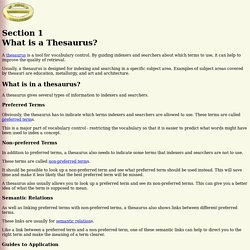
By guiding indexers and searchers about which terms to use, it can help to improve the quality of retrieval. Usually, a thesaurus is designed for indexing and searching in a specific subject area. Examples of subject areas covered by thesauri are education, metallurgy, and art and architecture. What is in a thesaurus? A thesaurus gives several types of information to indexers and searchers. Preferred Terms Obviously, the thesaurus has to indicate which terms indexers and searchers are allowed to use. This is a major part of vocabulary control - restricting the vocabulary so that it is easier to predict what words might have been used to index a concept. Non-preferred Terms In addition to preferred terms, a thesaurus also needs to indicate some terms that indexers and searchers are not to use.
These terms are called non-preferred terms. It should be possible to look up a non-preferred term and see what preferred term should be used instead. Summary. Meet Them in the Moment: Engaging Public Library Patrons When It Matters Most. Introduction In the winter and spring of 2015, EBSCO’s User Research team conducted a large-scale, qualitative research project to learn more about how people feel and think about their public libraries, as well as how they use them (or don’t).
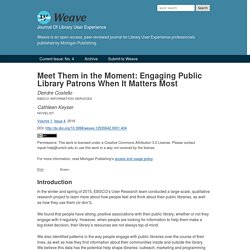
We found that people have strong, positive associations with their public library, whether or not they engage with it regularly. However, when people are looking for information to help them make a big-ticket decision, their library’s resources are not always top-of-mind. We also identified patterns in the way people engage with public libraries over the course of their lives, as well as how they find information about their communities inside and outside the library. We believe this data has the potential help shape libraries’ outreach, marketing and programming efforts to captivate different audiences, and to make the library a top-of-mind resource for any information need.
Takeaways Methodology Sample Sessions Data Analysis Timeline Figure 1. Dublin Core Metadata Element Set, Version 1.1. Introduction The Dublin Core Metadata Element Set is a vocabulary of fifteen properties for use in resource description.
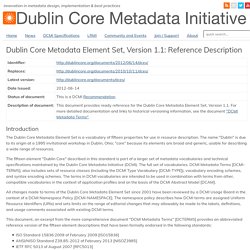
The name "Dublin" is due to its origin at a 1995 invitational workshop in Dublin, Ohio; "core" because its elements are broad and generic, usable for describing a wide range of resources. The fifteen element "Dublin Core" described in this standard is part of a larger set of metadata vocabularies and technical specifications maintained by the Dublin Core Metadata Initiative (DCMI).
The full set of vocabularies, DCMI Metadata Terms [DCMI-TERMS], also includes sets of resource classes (including the DCMI Type Vocabulary [DCMI-TYPE]), vocabulary encoding schemes, and syntax encoding schemes. The terms in DCMI vocabularies are intended to be used in combination with terms from other, compatible vocabularies in the context of application profiles and on the basis of the DCMI Abstract Model [DCAM]. References The Elements. On the Theory of Library Catalogs and Search Engines / Eversberg, Bernhard. Nothing is more practical than a good theory.
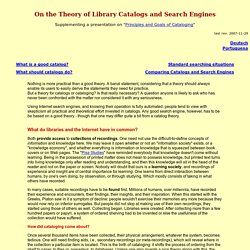
A banal statement, considering that a theory should always enable its users to easily derive the statements they need for practice. But a theory for catalogs or cataloging? Is that really necessary? A question anyone is likely to ask who has never been confronted with the matter nor considered it with any seriousness. Using Internet search engines, and knowing their operation is fully automated, people tend to view with skepticism all practical and theoretical effort invested in catalogs. What do libraries and the Internet have in common? Both provide access to collections of recordings. In many cases, suitable recordings have to be found first. How did cataloging come about? Once several thousand items have been collected, their physical arrangement, whatever the system, becomes tedious. Once one has millions, the assembling of the finding-aids in itself becomes quite a considerable effort.